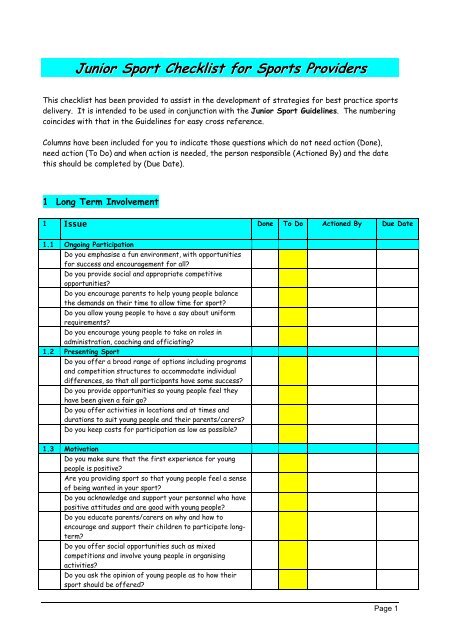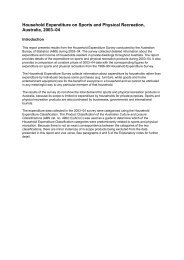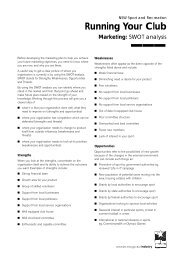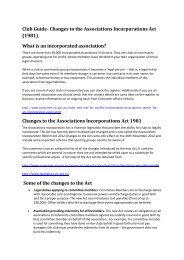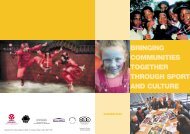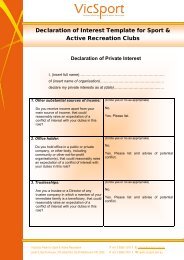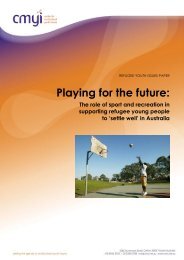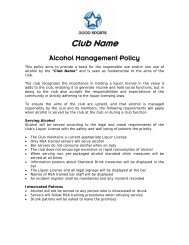ASC Junior Sport Policy Checklist for Clubs - VicSport
ASC Junior Sport Policy Checklist for Clubs - VicSport
ASC Junior Sport Policy Checklist for Clubs - VicSport
You also want an ePaper? Increase the reach of your titles
YUMPU automatically turns print PDFs into web optimized ePapers that Google loves.
<strong>Junior</strong> <strong>Sport</strong> <strong>Checklist</strong> <strong>for</strong> <strong>Sport</strong>s ProvidersThis checklist has been provided to assist in the development of strategies <strong>for</strong> best practice sportsdelivery. It is intended to be used in conjunction with the <strong>Junior</strong> <strong>Sport</strong> Guidelines. The numberingcoincides with that in the Guidelines <strong>for</strong> easy cross reference.Columns have been included <strong>for</strong> you to indicate those questions which do not need action (Done),need action (To Do) and when action is needed, the person responsible (Actioned By) and the datethis should be completed by (Due Date).1 Long Term Involvement1 Issue Done To Do Actioned By Due Date1.1 Ongoing ParticipationDo you emphasise a fun environment, with opportunities<strong>for</strong> success and encouragement <strong>for</strong> all?Do you provide social and appropriate competitiveopportunities?Do you encourage parents to help young people balancethe demands on their time to allow time <strong>for</strong> sport?Do you allow young people to have a say about uni<strong>for</strong>mrequirements?Do you encourage young people to take on roles inadministration, coaching and officiating?1.2 Presenting <strong>Sport</strong>Do you offer a broad range of options including programsand competition structures to accommodate individualdifferences, so that all participants have some success?Do you provide opportunities so young people feel theyhave been given a fair go?Do you offer activities in locations and at times anddurations to suit young people and their parents/carers?Do you keep costs <strong>for</strong> participation as low as possible?1.3 MotivationDo you make sure that the first experience <strong>for</strong> youngpeople is positive?Are you providing sport so that young people feel a senseof being wanted in your sport?Do you acknowledge and support your personnel who havepositive attitudes and are good with young people?Do you educate parents/carers on why and how toencourage and support their children to participate longterm?Do you offer social opportunities such as mixedcompetitions and involve young people in organisingactivities?Do you ask the opinion of young people as to how theirsport should be offered?Page 1
2 Issue Done To Do Actioned By Due datejunior sport providers?2.5 Gender and SexualityDo you target girls or boys with specific programs <strong>for</strong>developing their skills and confidence?Do you offer a choice of single-sex or mixed teams andcompetitions?Do you promote language and behaviours so as not todemean young people based on gender or sexuality?2.6 Geographical LocationDo you modify rules to enable participants fromregional and remote areas to make up a team (eg mixedsex and age teams; including parents, teachers andothers; reduced team sizes)?Do you run mini-competitions to suit local playing baseand conditions?Do you increase opportunities to travel by organisingparent rosters, car pooling and bus transport?Do you try to assist with accommodation and travel <strong>for</strong>training and competition away from home?Have you considered providing a pathway from rural andremote communities to urban based sport?Are you able to provide high per<strong>for</strong>mance coaching inrural and remote communities?Have you linked with other communities to worktogether to provide sport <strong>for</strong> young people?2.7 Indigenous AustraliansCan you assist in establishing junior competitions inIndigenous urban, rural or remote communities?Do you provide education and development <strong>for</strong>Indigenous sport providers?Do you provide coaching expertise, resources andopportunities <strong>for</strong> Indigenous young people?Do you offer culturally relevant support <strong>for</strong> Indigenousyoung people who relocate to participate in sport?Do you provide cross-cultural awareness training <strong>for</strong> allsport providers working with Indigenous young people?Do you assist with travel to allow participation ofIndigenous young people?2.8 Socio-economic StatusDo you encourage community involvement in supportingyoung people from low socio-economic areas?Do you look <strong>for</strong> opportunities to partner with otherorganisations servicing low socio-economic areas?Have you investigated offering opportunities in schoolslocated in low socio-economic areas?Do you provide lower participation fees <strong>for</strong> youngpeople from low socio-economic areas?Do you minimise requirements to purchase uni<strong>for</strong>ms (egallow young people to wear anything of a certaincolour)?Do you coordinate assistance <strong>for</strong> travel to and fromtraining and competition?Do you provide financial subsidies <strong>for</strong> players from lowPage 3
2 Issue Done To Do Actioned By Due datesocio-economic areas <strong>for</strong> representative teams?2.9 Equity of OpportunityDo you provide equal opportunity <strong>for</strong> all young people toparticipate?Do you document guidelines <strong>for</strong> team selection, providethese to all involved and monitor their implementation?Do you have transparent selection processes <strong>for</strong> team/event/special opportunity/position on team/time oncourt/field etc?Do you monitor your selection guidelines to gauge howwell they are helping decision making?3 Physical Growth and Maturation3 Issue Done To Do Actioned By Due Date3.1 Accommodating Growth and Maturation - TrainingDo you prepare training programs based on individualgrowth and maturation patterns?Do you monitor <strong>for</strong> body changes indicating a growthspurt and take particular care during this time?Do you question young people about the impact oftraining on their bodies?Do you help young people understand that theirindividual growth and maturation affects their skill andcompetition success?Do you educate parents/carers on issues related togrowth and maturation of their children (eg signs ofconcern and how to input into scheduling of training andcompetition)?Do you monitor <strong>for</strong> signs of poor eating practices andseek professional advice on healthy nutrition?Do you seek early expert assistance when there isconcern about how a young person is coping withtraining?3.2 Accommodating Growth and Maturation - CompetitionDo you focus on personal improvement not comparisonagainst others’ per<strong>for</strong>mances?Have you considered using varied criteria <strong>for</strong> groupings(eg skill level, years involved in the sport) rather thanchronological age?Have you considered using handicapping to reduce theeffects of growth and maturation differences?Do you allow boys and girls to play together when skills,physical maturation and psychological development aresimilar?3.3 Talent DevelopmentDo you focus on maintaining participation whatever thegrowth and maturation to allow individuals to achievetheir potential?Do you undertake talent identification and developmentPage 4
5 Issue Done To Do Actioned By Due Dateovercoming these?Do you hold regular meetings to maintain goodcommunication among stakeholders?5.3 Sharing ResourcesDo you promote the sharing of resources acrossorganisations and groups so that young people benefit inmore and better opportunities to participate in sport?Do you have in place processes which help groups toeffectively share resources without too many concerns(eg resource agreements)?Have you investigated sharing maintenance costs as amajor benefit of sharing resources?Do you recognise individuals and groups who share theirresources?Have you considered possible sponsorship conflict whenyou plan sharing resources?5.4 Schools Forming LinksDo you identify and liaise with local sportingorganisations (eg clubs) and establish how you couldwork together to benefit young people?Do you coordinate your program with otherorganisations to avoid clashes?Do you promote, support and recognise strong linksacross organisations and groups providing junior sport?Do you have a data base of contacts and programs inyour area?Do you have a checklist of requirements <strong>for</strong> clubstrying to get access to your school?Do you encourage the joint use of facilities andequipment?5.5 <strong>Clubs</strong> Forming LinksHave your identified what your club has to offerschools and other organisations?Have you appointed a key contact person <strong>for</strong> your club?Have you contacted other organisations in your areaand established how best to work together?Do you have a data base of key contacts?Have you asked your state sport associations and localand state government how they can help you?Have you made arrangements with schools to haveregistration days at their venue?Do you provide a professional service so otherorganisations will want to build links with you?Do state development officers tell you when they areconducting programs in schools, and do you follow-up onthis?Page 6
6 People Making it Happen6 Issue Done To Do Actioned By Due Date6.1 Young PeopleHave you distributed the Players Code of Behaviour?Do you include young people in decisions and deliveryof their sport?Do you encourage young people in volunteer roles?Do you monitor how young people behave and takeaction if physical or verbal abuse is apparent?Do you encourage young people to always play fair andto acknowledge the per<strong>for</strong>mance and contribution ofothers?6.2 Parents and CarersDo you have a mechanism <strong>for</strong> seeing every parentreceives a copy of the Code of Behaviour <strong>for</strong> Parents?Do you encourage parents and carers of every child totake an active role in their young people’s sport?Have you made it clear to parents/carers that fun,friendship and personal achievement is moreimportant than winning?Have you provided a list of ways parents and carerscan assist their young people and the sport?Do you involve parents in planning and attending socialfunctions?Do you acknowledge the important role parents andcarers play in supporting their child’s involvement?Do you request that parents/carers send protectiveequipment with their young people <strong>for</strong> safeparticipation?6.3 School TeachersDo you help teachers to promote and support sport<strong>for</strong> young people?Do you provide in<strong>for</strong>mation <strong>for</strong> teachers to distributeto young people, parents and carers?Are you encouraging teachers to build links with yourorganisation to benefit the provision of junior sport?Do you assist in updating teachers’ knowledge andskills?Do you recognise school teachers who contribute tojunior sport?6.4 CoachesHave your coaches been given a copy of the Code ofBehaviour <strong>for</strong> Coaches?Do you discuss with your coaches the roles you expectthem to provide <strong>for</strong> young people?Do your coaches give praise, positive feedback,rein<strong>for</strong>cement and encouragement so young peopleenjoy participating?Do your coaches counsel young people and resolveconflicts when needed?Have you stipulated that your coaches display highstandards of behaviour, at all times acting as a rolePage 7
6 Issue Done To Do Actioned By Due Datemodel?Do your coaches develop team respect and work wellwith others (eg officials) to show young people howthey should behave?Do your coaches use inclusive and respectfullanguage?Do you suggest coaches have a mentor and back-upperson to assist them?Do you encourage your coaches to undertakecomprehensive training and updating in coachingmethods and safety procedures?6.5 OfficialsHave officials been given a copy of the Code ofBehaviour <strong>for</strong> Officials?Do your officials inspect facilities, equipment etc <strong>for</strong>safety?Do your officials provide rule education as well as rulemanagement <strong>for</strong> your young people?Do your officials acknowledge participants when theydemonstrate good behaviour?Are your officials fair, consistent, and positive intheir interactions?Do your officials control negative reaction andcomments from spectators?Do your officials set a good example through theiractions and words?Do officials know what is expected of them, and keepup to date with the latest trends and safetypractices?6.6 AdministratorsHave you modified the Codes of Behaviour <strong>for</strong> yoursport, and distributed them to all the appropriatepeople including administrators?Do you monitor that everybody is keeping to theguidelines in the Codes of Behaviour?Do you plan and monitor risk management, making sureall policies are communicated and actioned?Do you recruit volunteers, and then recognise theirinput?Have you identified parent/carer skills, used themwhere appropriate, and then acknowledged their help?Do you encourage partnerships to maximise thecontribution of others (eg parents and schools)?Do you promote opportunities so volunteers know howthey could assist?Have you emphasized the benefit of extendingparticipation to include volunteering opportunities?Do you establish links with high schools and trainstudents to assist primary school students?Do you support volunteers by providing training,resources, mentoring and opportunities to buildpartnerships?Do you provide training <strong>for</strong> personnel and back-upPage 8
6 Issue Done To Do Actioned By Due Datepersonnel where possible?Do you have documented procedures <strong>for</strong> training newpersonnel?Do you document content, delivery, and completion oftraining?Do you encourage all personnel to enhance their skillsthrough training, accreditation and updating?Do you offer training organised to maximise thenumber of people who will undertake it?Do you encourage young people to take leadershiproles?Do you have a mentoring scheme <strong>for</strong> your personnel?Do you provide the resources to assist leaders toextend their leadership skills?Do you recognise the work of leaders in publicationsand at functions?Do you let leaders lead, and not over-manage them?6.7 VolunteersDo you give your volunteers the Codes of Behaviour<strong>for</strong> all roles undertaken?Do your volunteers take up opportunities to increasetheir knowledge and skills?Do you encourage your volunteers to act as mentors<strong>for</strong> others?Do you offer opportunities <strong>for</strong> volunteers to buildpartnerships with other volunteers?7 Quality Coaching7 Issue Done To Do Actioned By Due Date7.1 PlanningWhen planning sessions or season programs aremodifications made according to the development ofparticipants (eg skill level, knowledge)?Does planning accommodate the motivations andexpectations of the young people themselves?Do you consider the cultural backgrounds and specialneeds of participants?Are learning goals set in relation to movement skills,knowledge and understanding?Do you include a focus on etiquette and standards ofbehaviour?Has an overall management plan (use of space, time,equipment and facilities) been prepared?Are there fun elements in all activities?Do you evaluate your sessions and make changes?Page 9
7 Issue Done To Do Actioned By Due Date7.2 Coaching <strong>Sport</strong>s SkillsAre instructions simple and clear and delivered usinglanguage appropriate to participants?Do you maintain a positive manner at all times?Are strategies in place <strong>for</strong> expediting managementtasks so that more time can be spent practicing?Are young people as active as possible during sessions?Is instruction <strong>for</strong> a specific skill kept to a minimumbe<strong>for</strong>e participants are allowed to practice it?Are you breaking complex skills into tasks so that youngpeople learn easily?Do you include opportunities to practice under similarconditions to competition?Do you modify activities (eg change rules, times,distances) as the skills of the participants improve?Is feedback immediate, constructive and specific?Do you question the participants to see if instructionhas been understood?7.3 Coaching <strong>Sport</strong>s BehavioursDo you encourage fair play, self-control, cooperation,teamwork and team spirit?Are young people helped to develop respect <strong>for</strong> theability of others and <strong>for</strong> the judgement of officials,selectors and opposing coaches?Are anti-social behaviours such as cheating, aggression,‘put-downs’ and winning at all costs discouraged?Are healthy behaviours promoted (eg active lifestyles)?Do you help young people to build their self-confidence?Do you group participants so that everyone has thechance of success?Is your sport experience fun <strong>for</strong> everyone?8 Making <strong>Sport</strong> Safe8 Issue Done To Do Actioned By Due Date8.1 Facilities and EquipmentDo you have a documented procedure <strong>for</strong> checkingfacilities to make sure there are no <strong>for</strong>eseeable risks?Do you have the standard protective equipmentrecommended <strong>for</strong> your sport?Have you appointed someone to look after yourprotective equipment, see that it is returned after use,is maintained in a clean condition, and discarded andreplaced when necessary?Do you have procedures to check on the correct fit ofPage 10
8 Issue Done To Do Actioned By Due Dateprotective equipment and that it is functioningproperly?Is protective equipment available in all the sizesneeded?Do you have role models wearing safety equipment soyoung people follow by example?8.2 The EnvironmentDo you have clear written guidelines <strong>for</strong> what to do inadverse weather (wind, cold, heat, rain) about cancellingor postponing training or competition?Do coaches remind young people to drink water be<strong>for</strong>eand after training or competition and at selected timeswhen per<strong>for</strong>ming or practicing?Do you implement a “No hat – No play”, and makechildren aware of the need to avoid UV exposure withclothes and hats?Are shades available in hot weather <strong>for</strong> young peoplesitting out while training or competition is in progress?Do you ask parents/carers to send their children ready<strong>for</strong> safe sport (eg with mouth guards, hats, waterbottles)?8.3 Training and CompetitionAre your coaches updating their knowledge and skills onsafe training practices?Do all people working with young people understand thatchildren are not just small adults and there are timesduring growth when soft tissues and bones arevulnerable to injury through overuse or trauma?Have your coaches sufficient knowledge about adaptingtraining loads to individual needs?Do your coaches understand the detrimental effects ofoverload on young people, both physically andpsychologically?Are you using tools such as a training log to monitor thephysical and psychological progress of young peopleinvolved in serious training?Do you provide risk management <strong>for</strong> young peoplehelping with training and competition tasks (eg settingup)?Do you have guidelines <strong>for</strong> protecting young peoplewhen travelling and staying away from home?8.4 Infectious DiseasesAre you disseminating update in<strong>for</strong>mation on blood spillsand checking <strong>for</strong> understanding and implementation?Do you request young people to label their personalbelongings such as drink bottles and towels, and letthem know why they must not share them with otheryoung people?8.5 Medical ConditionsDo you get the parents/carers of young people tocomplete a pre-participation questionnaire providingin<strong>for</strong>mation on their child’s special needs, theimplications, and what to do in an emergency?Have you a mechanism <strong>for</strong> circulating this in<strong>for</strong>mationPage 11
8 Issue Done To Do Actioned By Due Dateto the people working with specific young people?Do you have procedures in place to maintain privacy ofthe in<strong>for</strong>mation in questionnaires?Do coaches have current first aid qualifications andknow what to do <strong>for</strong> individual young people with specialneeds?8.6 Preventing Drug UseDo you show your young people by example that it isbest not to use drugs because it is detrimental toper<strong>for</strong>mance as well as their health?Do you help your young people to understand theproblems of drug use?Do you actively discourage smoking, binge drinking ofalcohol and other drug use when celebrating aftercompetitions and at social functions?8.7 Weight ControlIf light weight is a concern in your sport, do you offeradvice to young people on healthy eating to keep weightat a desirable level?Do you have a mechanism <strong>for</strong> calling in help if a coachsuspects a young person is suffering from bulimia oranorexia nervosa?If your sport has a weigh-in to determine level <strong>for</strong>competition, are your young people made aware of thedangers of dehydration, laxatives etc?8.8 Dealing with EmergenciesDo you have a mechanism <strong>for</strong> making sure peopleworking with young people have current first aidtraining?Do you have a first aid kit and rescue equipmentavailable at training and competitions?Are there written procedures <strong>for</strong> dealing withemergencies?Are records with contact details <strong>for</strong> parents andcarers easily accessed by people working with youngpeople?Do you follow up on emergencies, notify your NSO, andchange procedures if needed?Do you keep records of emergencies and contribute tothe national database of injuries kept by SMA?9 The Law and <strong>Sport</strong>9 Issue Done To Do Actioned By Due Date9.1 Discrimination and Sexual HarassmentDo you circulate in<strong>for</strong>mation on DSH, record who hasreceived it (and the date), and check it is beingimplemented?Have you decided who is to in<strong>for</strong>m young people andtheir parents of their legal rights? And how it will bedone?Page 12
9 Issue Done To Do Actioned By Due DateDo you have a mechanism <strong>for</strong> keeping records of anycomplaints received? And what action is to be takenimmediately on receiving a complaint?Have you developed a strategy <strong>for</strong> what you will dowhen a complaint comes in (eg who is to deal with thecomplaint)?Has a decision been made on who will offer mediationand counselling in abuse situations?9.2 Child ProtectionDo you have a mechanism <strong>for</strong> in<strong>for</strong>ming everyone ofappropriate standards of behaviour?Do you screen applicants <strong>for</strong> positions working withchildren?Have you made everyone aware of their duty of care toyoung people with regard to reporting any suspectedabuse? How are you doing this, verbally or in writing?Do you have a mechanism <strong>for</strong> dealing with complaintsquickly?Have you appointed a Harassment/Child ProtectionContact Officer and let everyone know who this personis and how they contact him/her?Have you developed a strategy <strong>for</strong> handling complaints(eg who is to deal with the complaint, what authoritieswill be in<strong>for</strong>med)?9.3 Drugs in <strong>Sport</strong>Do you in<strong>for</strong>m sports providers and participants aboutbanned drugs and the consequences of taking them?Do you advise everyone how they can confidentiallyseek advice and assistance to deal with problems?9.4 OHS Risk ManagementHave you actioned someone to do a hazard audit of yourtotal sports environment, prepare a risk managementplan, and implement any changed needed?Do you in<strong>for</strong>m people such as coaches and officials oftheir duties in regard to OHS?Have you obtained the OHS in<strong>for</strong>mation (brochuresetc) you need?Have you appointed a person <strong>for</strong> people to contact whenthey have an OHS problem? Does this person followthrough and resolve the problem?9.5 PrivacyHave you obtained a copy of the <strong>ASC</strong>’s guide onprivacy?Are you meeting the requirements <strong>for</strong> privacyprotection?Do you seek written approval from parents/guardiansbe<strong>for</strong>e using any young person’s visual or audio materialin any public medium?Page 13


